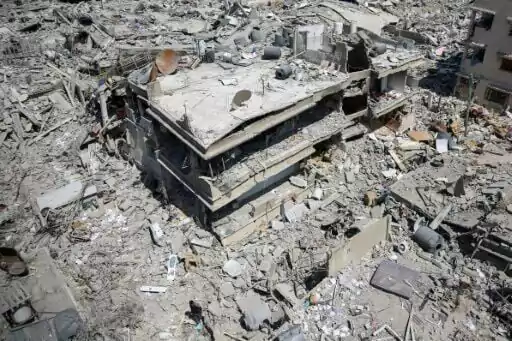The World Health Organization said on Saturday that Gaza’s largest hospital had been reduced to ashes by Israel’s latest siege, leaving an “empty shell” with many bodies.
WHO staff who gained access on Friday to the devastated facility described horrifying scenes of bodies only partially buried, with their limbs stick-ing out, and the stench of decomposing corpses.
Israeli forces pulled out of Al-Shifa hospital in Gaza City on Monday after a two-week military operation, during which it said it had battled Pales-tinian “militants” inside what was once the Palestinian territory’s most important medical complex.
A WHO-led mission finally accessed the hospital on Friday, after multiple failed attempts since March 25, the United Nations health agency said.
It found massive destruction and heard reports that patients had been “held in abysmal conditions” during the siege and several had died.
“WHO and partners managed to reach Al-Shifa — once the backbone of the health system in Gaza, which is now an empty shell with human graves after the latest siege,” WHO director-general Tedros Adhanom Ghebreyesus wrote on X, formerly Twitter.
In a statement, WHO said no patients remained in the hospital, where “numerous shallow graves” had been dug just outside the emergency department and the administrative and surgical buildings.
“Many dead bodies were partially buried with their limbs visible,” it said. During their visit, WHO staff witnessed “at least five bodies lying partially covered on the ground, exposed to the heat”, it said.
“The team reported a pungent smell of decom-posing bodies engulfing the hospital compound.”
“Safeguarding dignity, even in death, is an in-dispensable act of humanity,” the WHO stressed.
The mission, which was conducted in cooperation with other UN agencies and the acting hospital director, found that “the scale of devastation has left the facility completely non-functional”.
“Most of the buildings in the hospital complex are extensively destroyed and the majority of assets damaged or reduced to ashes,” Tedros said.
“Even restoring minimal functionality in the short term seems implausible.” WHO said the acting hospital director had described how patients were “held in abysmal conditions during the siege”.
“They endured severe lack of food, water, health care, hygiene and sanitation, and were forced to relocate between buildings at gun point,” it said.
At least 20 patients reportedly died, it said, “due to the lack of access to care and limited movement authorised for health personnel”.
Tedros said efforts by WHO and other aid groups to revive basic services at Al-Shifa after Israel’s first devastating raid on the hospital last year “are now lost”.
“People are once again deprived of access to life-saving health care services,” he continued.
Of Gaza’s 36 main hospitals, only 10 remain even partially functional, according to the WHO.
For the past six months, Israel has relentlessly bombarded the besieged, densely populated Pales-tinian territory, killing at least 33,137 people, mostly women and children, according to the Hamas-run health ministry.
The current Gaza war began after a cross-border attack by Hamas fighters on October 7 that resulted in the death of 1,170 people in Israel, mostly civilians, according to an AFP toll from official Israeli figures.
Palestinian militants also took around 250 hos-tages, about 130 of whom remain in Gaza. The Israeli army says more than 30 are dead.
Tedros said urgent action was needed in Gaza as “famine looms, disease outbreaks spread and trauma injuries increase” among the trapped Palestinian population.
He called for the “protection of remaining health facilities in Gaza… unimpeded access of humanitarian aid into and across the Gaza Strip” and a “ceasefire”.
He also called for a “functional deconfliction mechanism”, referring to the process of clearing aid missions in advance with the Israeli military to ensure they can go ahead safely and unhindered.
“Despite deconfliction, yesterday’s mission faced significant delays at the military checkpoint en route to Al-Shifa hospital,” the WHO pointed out.
It said that “between mid-October and the end of March, over half of all WHO missions had been denied, delayed, impeded or postponed” by the Israelis.
“As health needs soar, the lack of a functional deconfliction system is a major obstacle in delivering humanitarian aid — including medical supplies, fuel, food and water to hospitals — anywhere close to the scale needed,” it said.—AFP










